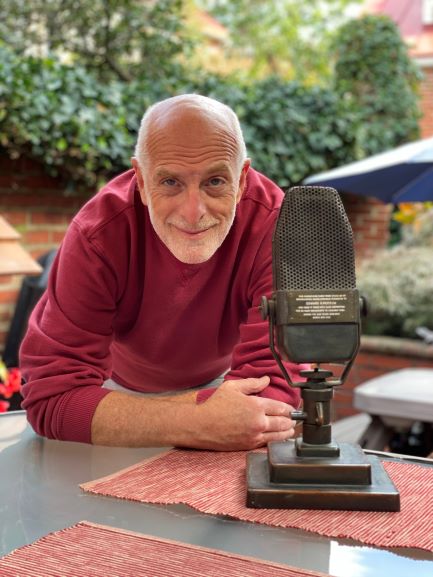Authors:
Historic Era: Era 8: The Great Depression and World War II (1929-1945)
Historic Theme:
Subject:
November 2020 | Volume 65, Issue 7


Authors:
Historic Era: Era 8: The Great Depression and World War II (1929-1945)
Historic Theme:
Subject:
November 2020 | Volume 65, Issue 7
On a sunny and crisp Saturday morning last month, at a rest stop on New Jersey’s Garden State Parkway, there was a clandestine handoff of “the Holy Grail of broadcast journalism.”
Casey Murrow, the son of legendary CBS journalist Edward R. Murrow presented the President of the National Press Club Michael Freedman with several of his father's personal possessions and agreed to loan the Club the historic BBC microphone used by Murrow for his CBS Radio broadcasts from London during World War II.
See also: “This Is London: Murrow Broadcasts During the Blitz” by Bob Edwards in this issue
“Modern broadcast journalism was literally invented on that microphone,” said Freedman, a former general manager of CBS Radio Network. “It is indeed the Holy Grail of the profession."

The example that Murrow set can inspire journalists today. “Murrow was more than a great journalist who appreciated the fundamental importance of facts in telling a credible story,” Marvin Kalb recently said in an interview with the Press Club. “He was also a pioneer in broadcast news. Others helped, of course, but more than anyone, he created the industry. He gave life and form to the news broadcasts on radio and television that we today take for granted as our birthright.”
“Murrow matters, because the best of American journalism is rooted in knowledge, meaning fact,” continued Kalb. “Murrow based his most memorable broadcasts on fact, not opinion—what he himself saw from London rooftops during the Nazi blitz, what he himself observed during McCarthy’s assault on democratic institutions in the 1950’s.”
Garden State Parkway meeting
In the midst of the global pandemic and concerned about shipping such precious cargo, Murrow and Freedman agreed to meet part way between their homes in Vermont and Virginia. They selected a service area along the Garden State Parkway.
Both arrived on time at 11 a.m. and unbeknownst to the other travelers who were stretching their legs and buying coffee, an exchange of historic proportions took place in the parking lot.
Among the items Casey Murrow placed in Freedman's car as donations to the Club were his father's briefcase, hunting vest, poker chips, and archivally framed photos and art that hung in Ed Murrow's office and home. All will be displayed in the Murrow Room and elsewhere in the Club over the coming months.
“The Murrow family is thrilled that these artifacts will be part of the collection at the National Press Club,” Casey Murrow said. “It seems to us a fitting location for both memorabilia and photographs of Ed Murrow, whose impact on radio and TV journalism continues to inspire us all, over five decades after his death.”
Historic microphone to used after 75 years
A plaque on the historic microphone that launched the era of